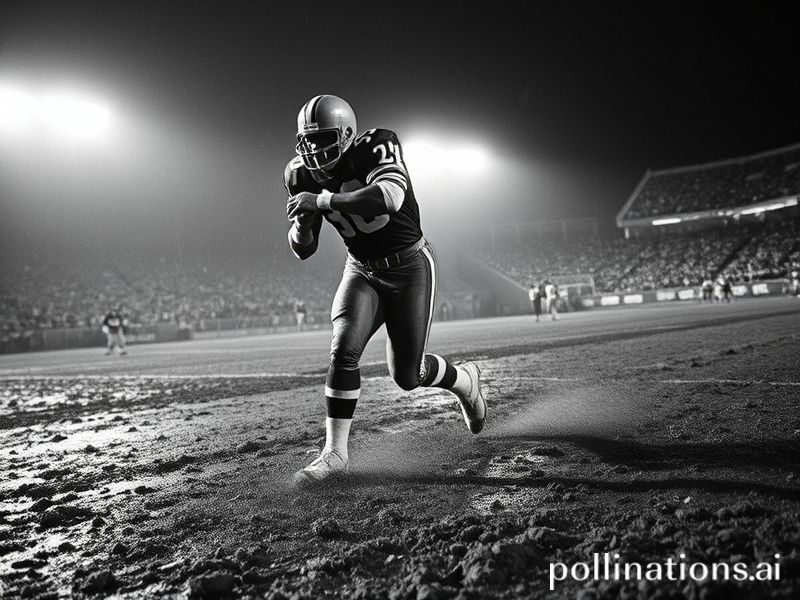Jim Brown’s Global Playbook: How a Cleveland Linebacker Became an Accidental Diplomat (and Other Tragicomedies of Power)
The Last Full-Contact Diplomat: Why the World Still Cares About Jim Brown, Dead or Alive
By our man in the cheap seats of global memory
Cleveland, Ohio, is not, by any stretch of diplomacy, a world capital. Its river once caught fire—twice—an achievement even Beirut politely calls déclassé. Yet when news of Jim Brown’s death at 87 rippled out last May, foreign editors from Lagos to La Paz felt the tremor. Not because Americans need another excuse for televised grief, but because Brown was the rare U.S. export who managed to be both blunt instrument and subtle lesson in how power likes to dress up as entertainment.
Start with the basics: Brown ran a football like he was repossessing it from a deadbeat nation, then pivoted to Hollywood, playing hyper-masculine cartoons at the precise moment the Pentagon was learning to do the same. While the State Department was busy losing the Vietnam War in five-part harmony, Brown was in The Dirty Dozen showing the world that American problem-solving looked suspiciously like a jailbreak with better lighting. Europeans, still sweeping up the rubble of empire, watched those films and understood the subtext: the same country that exported Marshall Plans also shipped he-men who could snap you in half at the moral ambiguity.
But Brown’s true passport was forged off-screen. In 1967, when most athletes were still thanking Jesus and the local car dealership, Brown organized the “Cleveland Summit,” dragging Muhammad Ali, Bill Russell, and Kareem Abdul-Jabbar into a room to decide whether Ali should go to jail for refusing Vietnam. The summit didn’t stop the draft, but it did introduce a novel concept: Black American athletes as non-aligned nations, negotiating with Washington from a position of moral leverage. Overnight, a linebacker from St. Simons Island became a sort of freelance foreign ministry, issuing visas of legitimacy to causes that official America found irritating.
Dictatorships took notes. When Pele visited Nigeria during the Biafran War for a Santos exhibition match in 1969, the Nigerian government declared a 48-hour ceasefire—not because football cures bloodlust, but because Brown had demonstrated a decade earlier that star athletes could broker truces more credibly than UN envoys still wearing safari jackets. Authoritarians, always keen on cheaper alternatives to peace, began cultivating their own sports ambassadors. Today’s Gulf sheikhdoms buying entire European leagues? That’s just Jim Brown’s ghost in a thawb, whispering that soft power is cheaper than aircraft carriers and considerably quieter during Ramadan.
Of course, Brown’s résumé isn’t the kind you print on LinkedIn. Domestic-violence allegations trailed him like paparazzi, and he never met a camera he couldn’t out-stare. International observers—especially those from societies where #MeToo arrived via Twitter rather than subpoena—watched the American habit of separating greatness from grotesquerie with the same curiosity one reserves for a carnival knife-thrower who occasionally hits the assistant on purpose. The lesson: if you’re charismatic enough, the statute of limitations can be persuaded to take a coffee break.
Now that he’s gone, the world is left holding the tab. Brown’s legacy is a reminder that American soft power was never just jazz and blue jeans; it was also a 230-pound running back who could dislocate your worldview. Every time a Brazilian striker speaks out about Amazon deforestation, or a Kenyan marathoner demands cleaner air in Nairobi, they’re channeling the same playbook Brown scribbled in the margins: use the stage before the stage uses you.
And yet, cynics will note the final irony: the NFL now sells military flyovers and camouflage hoodies, monetizing patriotism at commercial breaks. Brown, who once threatened to walk away from the league rather than be told what to think, would probably smirk at the transaction. Somewhere between the 50-yard line and the afterlife, he’s likely negotiating a new contract—terms undisclosed, but guaranteed to include unlimited airtime and no trade clause on integrity.
The planet keeps spinning, dictators keep hiring PR firms, and athletes still pretend Twitter is diplomacy. But for one brief, bruising moment, a man from Georgia showed the world that sometimes the most effective foreign policy is just refusing to run out of bounds.







